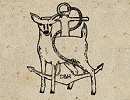Contact Seller
Doe And Hope
Tel07729 213013Please quote Antiques Atlas.


 Country Elm Drop Flap Table 2 Drawer 1710
Country Elm Drop Flap Table 2 Drawer 1710
 Large French Bleached Oak Farmhouse Dining Table
Large French Bleached Oak Farmhouse Dining Table
 Antique 17th Century Oak Gateleg Table
Antique 17th Century Oak Gateleg Table
 Late 18th Chestnut Spanish Farmhouse Table
Late 18th Chestnut Spanish Farmhouse Table
 Antique 17th Century Quality Oak Double Gate Leg
Antique 17th Century Quality Oak Double Gate Leg
 Arts and Crafts Oak Gateleg Table.
Arts and Crafts Oak Gateleg Table.
 Charles I, Carved Oak Table, England, Circa 1630
Charles I, Carved Oak Table, England, Circa 1630
 Six Seater 5ft x 4ft Pine Scrub Top Farmhouse Table
Six Seater 5ft x 4ft Pine Scrub Top Farmhouse Table
 Refectory Table
Refectory Table
 Small Kitchen Table with Bobbin Turned Legs c.1860
Small Kitchen Table with Bobbin Turned Legs c.1860
 A superb English oak kitchen refrectory farmhouse
A superb English oak kitchen refrectory farmhouse
 18thc Oak Gate Leg Table
18thc Oak Gate Leg Table
Non UK callers :
+44 7729 213013
Wonderful 17thC English Oak Refectory Table


The seventeenth century oak refectory table having a richly coloured rectangular boarded top with pegged ends on turned baluster legs joined by a low level 'H' stretcher, survives from late seventeenth century Stuart period England.
The condition is hugely evocative of its life thus far and as such is not for those who favour perfection but large doses of Stuart period character. There may be later additions and there is a triangular shaped repair to the top which also has bowing, splits and losses. These include a corner section of loss, and two or three cracks running through the top that have widened with temperature changes throughout its years. The underside of the top is a fabulous grey oak colour, expected with oak of this age. There are sections of gnarled loss to the legs, especially to one in particular and another of the legs looks like a possible later replacement as the turnings are not quite of the same proportions as the other three. The colour and patination is superb to the top and we have given her a light wax. We don’t believe any of these imperfections make the table any less practical but if one is shy of character it may be best to look elsewhere.
A refectory table is a elongated table used originally for dining in monasteries in Medieval times. In the Late Middle Ages the table gradually became a banqueting or feasting table in castles and other noble residences. This example is not as elongated as some and is also a relatively small to medium proportioned example, seating six comfortably. The original table manufacture was by hand and created of oak or walnut the design is based on a trestle-style. Typically the table legs are supported by circumferential stretchers, as we see here, positioned very low to the floor. In its original use, one or more refectory antique tables were placed within the monks' dining hall or refectory and the larger refectories would have a number of refectory tables where monks would take their meals, often while one of the monks read sacred texts from an elevated pulpit.
When sitting at this table it is mandatory to use the King’s English “We have been bidden to dine tapster, where’s my ale?’
SellerDoe And Hope
View all stock from
Doe And Hope

 Private dealer, By appointment only
Private dealer, By appointment only
The Onion Barn, Shoe Cottage,
15 High Street, Blunham,
Bedfordshire, MK44 3NL.
MK44 3NL
Tel : 07729 213013
Non UK callers : +44 7729 213013
Get directions to Doe And Hope
The condition is hugely evocative of its life thus far and as such is not for those who favour perfection but large doses of Stuart period character. There may be later additions and there is a triangular shaped repair to the top which also has bowing, splits and losses. These include a corner section of loss, and two or three cracks running through the top that have widened with temperature changes throughout its years. The underside of the top is a fabulous grey oak colour, expected with oak of this age. There are sections of gnarled loss to the legs, especially to one in particular and another of the legs looks like a possible later replacement as the turnings are not quite of the same proportions as the other three. The colour and patination is superb to the top and we have given her a light wax. We don’t believe any of these imperfections make the table any less practical but if one is shy of character it may be best to look elsewhere.
A refectory table is a elongated table used originally for dining in monasteries in Medieval times. In the Late Middle Ages the table gradually became a banqueting or feasting table in castles and other noble residences. This example is not as elongated as some and is also a relatively small to medium proportioned example, seating six comfortably. The original table manufacture was by hand and created of oak or walnut the design is based on a trestle-style. Typically the table legs are supported by circumferential stretchers, as we see here, positioned very low to the floor. In its original use, one or more refectory antique tables were placed within the monks' dining hall or refectory and the larger refectories would have a number of refectory tables where monks would take their meals, often while one of the monks read sacred texts from an elevated pulpit.
When sitting at this table it is mandatory to use the King’s English “We have been bidden to dine tapster, where’s my ale?’
Price The price has been listed in British Pounds.
Conversion rates as of 17/DEC/2024. Euro & Dollar prices will vary and should only be used as a guide.
Always confirm final price with dealer. Phone or visit the website to buy, Free UK shipping.
DimensionsLength 62.5 inches
Width 27.5 inches
Height 29 inches
Leg Room 23.5 inches
Category Antique Furniture
Date c.1680-1700
17th Century Antiques Material Oak
Origin English
Condition Fair to Good.
Item code as155a997
Status Sold
£1495.00 
$1900.29 
€1809.85 

$

€

Conversion rates as of 17/DEC/2024. Euro & Dollar prices will vary and should only be used as a guide.
Always confirm final price with dealer. Phone or visit the website to buy, Free UK shipping.
View all stock from
Doe And Hope

 Private dealer, By appointment only
Private dealer, By appointment onlyThe Onion Barn, Shoe Cottage,
15 High Street, Blunham,
Bedfordshire, MK44 3NL.
MK44 3NL
Tel : 07729 213013
Non UK callers : +44 7729 213013
Get directions to Doe And Hope
You may also be interested in
 Country Elm Drop Flap Table 2 Drawer 1710
Country Elm Drop Flap Table 2 Drawer 1710
 Large French Bleached Oak Farmhouse Dining Table
Large French Bleached Oak Farmhouse Dining Table
 Antique 17th Century Oak Gateleg Table
Antique 17th Century Oak Gateleg Table
 Late 18th Chestnut Spanish Farmhouse Table
Late 18th Chestnut Spanish Farmhouse Table
 Antique 17th Century Quality Oak Double Gate Leg
Antique 17th Century Quality Oak Double Gate Leg
 Arts and Crafts Oak Gateleg Table.
Arts and Crafts Oak Gateleg Table.
 Charles I, Carved Oak Table, England, Circa 1630
Charles I, Carved Oak Table, England, Circa 1630
 Six Seater 5ft x 4ft Pine Scrub Top Farmhouse Table
Six Seater 5ft x 4ft Pine Scrub Top Farmhouse Table
 Refectory Table
Refectory Table
 Small Kitchen Table with Bobbin Turned Legs c.1860
Small Kitchen Table with Bobbin Turned Legs c.1860
 A superb English oak kitchen refrectory farmhouse
A superb English oak kitchen refrectory farmhouse
 18thc Oak Gate Leg Table
18thc Oak Gate Leg Table








